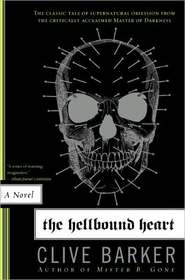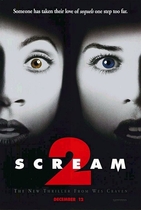Our editor-in-chief Nate Yapp is proud to have contributed to the new book Hidden Horror: A Celebration of 101 Underrated and Overlooked Fright Flicks, edited by Aaron Christensen. Another contributors include Anthony Timpone, B.J. Colangelo, Dave Alexander, Classic-Horror.com's own Robert C. Ring and John W. Bowen. Pick up a copy today from Amazon.com!
Cold Reads: The Hellbound Heart by Clive Barker
When we sleep, why is it so easy for our dreams to descend into nightmares? Why is our first reaction to a sudden pain to laugh at the sensation? Everything that exists seems to overlap into the next, breaking the barriers. The world of fantasy is just a breath away from reality, phantoms eagerly pressing in around the corners of our lives until they crack. Perhaps one of the most terrifying things about Clive Barker's novella "The Hellbound Heart" is that it reveals to us (and revels in) the symbiotic relationship between pain and pleasure, light and darkness, and the toll that it takes on our souls.
Frank has just received a most curious puzzle. Having tired of all the earthly pleasures and depravities to be had, Frank has been given Lemarchand's Box, a tool that will open the gates of another world and allow the emissaries of the Order of the Gash to come forward and bless him with pleasure unlimited. He soon finds out that there are differing levels of pleasure and remains trapped in the world of the Cenobites, his flesh at their mercy for what seems like an eternity. Frank's brother Rory and his cold-hearted wife Julia soon move into the house in which Frank made his untimely departure. When Rory's blood is spilled upon the floorboards of the accursed room, it awakens Frank's remains, which call out to Julia from the netherworld. Possessed by her deep love for and fascination with Frank, Julia begins to make sacrifices in order to restore Frank to human form. It is now up to Kirsty, a poor girl in love with Rory, to stop Frank's return and deal with the Cenobites who have come calling for their escaped soul...
This book is one nasty little piece of work. This is not to say that it is bad or of poor quality. It is just relentless in its pursuit to shock and repulse you. The first chapter alone is filled with horrifying and gut-wrenching imagery. After foolishly inviting the demons to bestow their gifts upon him, Frank is assaulted by a sudden, intense attack of highly acute senses. The most miniscule of sensations seem to ripple throughout his body like electric waves. His mind is besieged by sensuous fantasies of women which drive him to masturbate just in order to get them out of his head. After all this is over, he is confronted by a female Cenobite sitting on a pile of human heads. Rows of human tongues adorn her legs like perverse trophies and her genitalia are horribly mutilated. Then, in the most playful and seductive of tones, she invites Frank to really begin enjoying his new gift.
The insane opening is sure to put off some horror readers who are not use to such disturbing images in their literature. However, if one can get past the icky aesthetics, a deeper meaning will be discovered. Barker has a point in illustrating all these demented pictures to us. He is showing us how frail the line that separates our extreme emotional responses really is. The female Cenobite, for example, is upon first glance completely disgusting. The image of the tongues on her legs, however, stirs a sexual response in the reader's mind. The thought of sex is usually associated with pleasure, the warm fuzzy feeling, the "happy place." And yet amongst all the horror and ugliness this creature possesses, these thoughts of happiness and satisfaction invariably arise. It makes you shiver (with fear or ecstasy?) to realize just how closely these emotional responses are related.
Even during the scenes of "normal" sexuality, the reader also can't help but feel that something is a little... off. In one chapter, Julia passionately recalls the night prior to her wedding with Rory. The temptress wasn't engaging in some pre-marital hanky panky with her groom, though, but rather with his strapping brother Frank. As if the thought of infidelity isn't enough to unsettle us (they didn't even have cake yet!), Barker takes it to another level. Julia blatantly admits to herself that her sinful act felt more like a vicious rape (physically and mentally) than consensual lovemaking. And despite all of this, she enjoyed it. This may be simply because Julia may have a few screws loose, but this kind of admission seems to be saying something more. Barker is saying that we need some form of violence, some form of horror in our lives to help give us a clear sense of being alive. Pain and pleasure are intertwined, like strands of DNA. It is when we can experience them both simultaneously that we can go through truly transcendental occurrences.
All the characters in the story seem to be longing for more, wanting escape from their dull, drab lives. They also each appear to be dead in some manner, even before their last literal breaths. There is no real life behind their eyes, just that driving motivation to find... something. Frank wants something new, a plaything that won't bore him after three minutes, similar to a child at Christmas. He has rejected the world, deeming it an unworthy place for his presence. He feeds on lust and greed, his later thirst for blood equivalent to the hunger he felt for thrills in his human life. Julia wants to find love, or at least some kind of passion. She turns away from her own husband in her search, a search that leads her to make a Faustian pact that seals her fate. It is bone chilling to watch her seduce her victims and butcher them with the ease and poise of an accomplished murderess. Her constant comparison of these men to lambs on their way to the slaughter should raise a few hairs as well. Rory is looking for answers and some form of sense in an insane, lunatic world. He is the puppet of both Frank and Julia, constantly running about in circles that he is unaware of being the manipulations of his supposed loved ones.
And in this entire mix, there is Kirsty. She is the type of sweet, naïve girl who you could picture taking home to the parents. She, like Rory, does not take any initiative action in the story, but rather reacts to the doings of others. She literally stumbles with both her clumsiness and her feelings for Rory for most of the book. She is a wallflower, too shy and meek to speak her mind. In these terms, Kirsty may be labeled as socially deceased. Only when Lemarchand's Box falls into her lap and she becomes the next target for the Cenobites does she finally take the bull by the horns. The Cenobites themselves, ironically, seem to be the conduits of life and vitality. It is when they make their entrance that the other characters are awakened from their selfishness and pathetic pursuits. Through pain and torture, the Cenobites are giving the gift of life and terrifying sensation.
With all these layered messages being delivered, you would think that Barker would lose his handle on one of the most essential aspects of horror fiction: atmosphere. It pleases me to say that this assumption would be incorrect. One of the things that makes Barker so positively unique is that he unabashedly uses the world of fantasy in his horror tales. When I say this, I'm not necessarily referring to the supernatural realm of vampires, werewolves, and boogeymen. Barker brings a strange, intoxicating sense of pure magic to his stories. It's the type of fantasy that your dreams are made of, set to the trappings of a ghost story.
Barker hardly ever uses recognizable ghoulies and long-leggity beasties; his monsters are completely fresh and disturbingly human. His creatures are twisted men and women, stripped of both flesh and humanity until there is only an unearthly hunger left. There is a haunting moment when Kirsty, fleeing from the wrath the Cenobites are inflicting upon Frank, encounters a mystical being known as the Engineer. The artisan of torture is embodied as a specter wearing Julia's wedding dress, its head only a glowing flame. The moment is very brief, but the image stays with you. Barker vividly weaves his world of crowing birds, tolling bells, and the dark kingdom they inhabit to the pitch perfect level of genius. He is the literary equivalent of David Lynch, a talent who is completely in touch with nightmares and dreamscapes and portraying them in the ways that both pleasure and frighten us.
While it may be one-third the size of a best-selling novel, "The Hellbound Heart" packs a massive punch to the gut while stirring up the contents of the cranium. It is advised that anyone who is prone to fainting or have weak hearts and stomachs not to enter this theater of the macabre. The prose will dig into your skin with the fierce grip of the Cenobites's hooks and not let go until you have finished the book. As a last word of warning, it is asked that you please keep your hands and feet in the vehicle at all times. Clive Barker is behind the wheel and our destination is that damnable, mystifying, hellbound human heart.
Editor's Note: Barker made a film version of his novella, titled Hellraiser, which spawned several sequels.









The thing that I always found
The thing that I always found most bizarre about the book is the intentional refusal to explicate more than necessary about the relationships between the characters. Specifically, in the movie adaptation, Kirsty is the Rory-equivalent character's daughter from a previous marriage, whereas this is never made clear in the book. In fact, we're offered virtually no clue about what the exact relationship is between Kirsty and Rory -- father and daughter? siblings? cousins? exes who've remained on good terms? All possibilities apply about equally.
I thought HELLRAISER 2 was
I thought HELLRAISER 2 was closer to the book than the first movie.
phil
Hey Jose, really enjoyed
Hey Jose, really enjoyed reading your feature. Clive Barker's always been a favorite of mine, and you did a great job of showcasing one of his finer works. Can't wait to read what you come up with next.
I've never actually read a
I've never actually read a Clive Barker book. (My days are filled with things like Mary Gaitskill, who is horrifying in her own way.) But this intrigues me--particularly the Christly aspect of "lambs" being led to the slaughter. Mayhaps I will read this one.
For whatever reason, I've
For whatever reason, I've never sought to read this. Although your synopsis and interpretation has me intrigued, I must say that the events you describe and the warnings you present have me wary. The movies themselves were enough to unsettle me; I can't imagine what the novella would do.
Once again, though, you've made a convincing argument for reading, Jose (albeit genre-specific). It's a crime I can't get your articles into the hands of more people than I can, sir. We'll fight the good fight together!
Chris Gaskey
http://chrisgaskey.tumblr.com
http://www.skyemag.com
http://www.facebook.com/chrisgaskey
http://www.twitter.com/chrisgaskey
how many chapter has the book
how many chapter has the book Hellbound Heart?
Thanks!